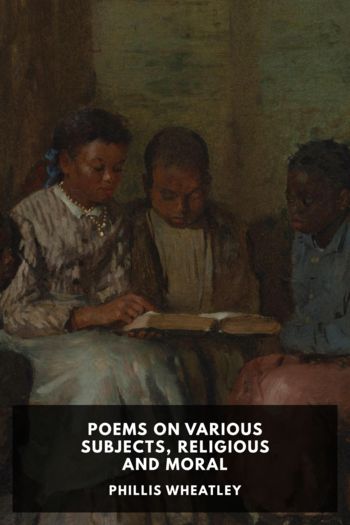The Autobiography of Benjamin Franklin - Benjamin Franklin (pocket ebook reader .txt) 📗

- Author: Benjamin Franklin
Book online «The Autobiography of Benjamin Franklin - Benjamin Franklin (pocket ebook reader .txt) 📗». Author Benjamin Franklin
A transaction in our fire company gave me some insight into their prevailing sentiments. It had been proposed that we should encourage the scheme for building a battery by laying out the present stock, then about sixty pounds, in tickets of the lottery. By our rules, no money could be disposed of till the next meeting after the proposal. The company consisted of thirty members, of which twenty-two were Quakers, and eight only of other persuasions. We eight punctually attended the meeting; but, though we thought that some of the Quakers would join us, we were by no means sure of a majority. Only one Quaker, Mr. James Morris, appeared to oppose the measure. He expressed much sorrow that it had ever been proposed, as he said Friends were all against it, and it would create such discord as might break up the company. We told him that we saw no reason for that; we were the minority, and if Friends were against the measure, and outvoted us, we must and should, agreeably to the usage of all societies, submit. When the hour for business arrived it was moved to put the vote; he allowed we might then do it by the rules, but, as he could assure us that a number of members intended to be present for the purpose of opposing it, it would be but candid to allow a little time for their appearing.
While we were disputing this, a waiter came to tell me two gentlemen below desired to speak with me. I went down, and found they were two of our Quaker members. They told me there were eight of them assembled at a tavern just by; that they were determined to come and vote with us if there should be occasion, which they hoped would not be the case, and desired we would not call for their assistance if we could do without it, as their voting for such a measure might embroil them with their elders and friends. Being thus secure of a majority, I went up, and after a little seeming hesitation, agreed to a delay of another hour. This Mr. Morris allowed to be extremely fair. Not one of his opposing friends appeared, at which he expressed great surprise; and, at the expiration of the hour, we carried the resolution eight to one; and as, of the twenty-two Quakers, eight were ready to vote with us, and thirteen, by their absence, manifested that they were not inclined to oppose the measure, I afterward estimated the proportion of Quakers sincerely against defense as one to twenty-one only; for these were all regular members of that society, and in good reputation among them, and had due notice of what was proposed at that meeting.
The honorable and learned Mr. Logan, who had always been of that sect, was one who wrote an address to them, declaring his approbation of defensive war, and supporting his opinion by many strong arguments. He put into my hands sixty pounds to be laid out in lottery tickets for the battery, with directions to apply what prizes might be drawn wholly to that service. He told me the following anecdote of his old master, William Penn, respecting defense. He came over from England, when a young man, with that proprietary, and as his secretary. It was wartime, and their ship was chased by an armed vessel, supposed to be an enemy. Their captain prepared for defense; but told William Penn, and his company of Quakers, that he did not expect their assistance, and they might retire into the cabin, which they did, except James Logan,82 who chose to stay upon deck, and was quartered to a gun. The supposed enemy proved a friend, so there was no fighting; but when the secretary went down to communicate the intelligence, William Penn rebuked him severely for staying upon deck, and undertaking to assist in defending the vessel, contrary to the principles of Friends, especially as it had not been required by the captain. This reproof, being before all the company, piqued the secretary, who answered, “I being thy servant, why did thee not order me to come down? But thee was willing enough that I should stay and help to fight the ship when thee thought there was danger.”
My being many years in the Assembly, the majority of which were constantly Quakers, gave me frequent opportunities of seeing the embarrassment given them by their principle against war, whenever application was made to them, by order of the crown, to grant aids for military purposes. They were unwilling to offend government, on the one hand, by a direct refusal; and their friends, the body of the Quakers, on the other, by compliance contrary to their principles; hence a variety of evasions to avoid complying, and modes of disguising the compliance when it became unavoidable. The common mode at last was, to grant money under the phrase of its being “for the king’s use,” and never to inquire how it was applied.
But, if the demand was not directly from the crown, that phrase was found not so proper, and some other was to be invented. As, when powder was wanting (I think it was for the garrison at Louisburg), and the government of New England solicited a grant of some from Pennsylvania, which was much urged on the House by Governor Thomas, they could not grant money to buy powder, because that was an ingredient of war; but they voted an aid to New England of three thousand pounds, to be put into the hands of the governor, and appropriated it for the purchasing of bread, flour, wheat, or other grain. Some of the council, desirous of giving the House still further embarrassment,





Comments (0)